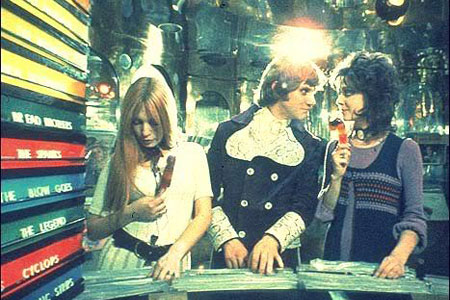A
Clockwork Orange (1971)
Based
on Anthony Burgess’ 1962 novella, A Clockwork Orange focuses on good vs. evil,
corruption, and controversial psychological experiments. Directed and produced
by Stanley Kubrick, I learned that he chose to leave out the final chapter of
the book from the movie. American publishers actually left out the 21st
chapter up until 1986. In this final chapter, Alex realizes why violence is
wrong and sees that everything he once believed is not true. Kubrick believed
this turn around was not consistent with the book. He, along with the US
publishers preferred this darker ending.
 The experiment injects him with a sort
of serum to make him feel sick and then he is forced to watch the violent acts
he once enjoyed. Now, instead of feeling pleasure towards evil, he feels sick.
He is deemed a success and is sent into the real world. After a beating from
his old gang, he finds himself at the door of Mr. Alexander-the same man Alex
and the droogs crippled and the husband of a woman they murdered. At first, Mr.
Alexander doesn’t recognize him and simply wants to help and get his story out
in the public to show the evils the government has done to him. Once he
realizes who Alex is, Mr. Alexander blasts Beethoven’s Ninth Symphony, torturing
Alex and driving him to jump out the window.
The experiment injects him with a sort
of serum to make him feel sick and then he is forced to watch the violent acts
he once enjoyed. Now, instead of feeling pleasure towards evil, he feels sick.
He is deemed a success and is sent into the real world. After a beating from
his old gang, he finds himself at the door of Mr. Alexander-the same man Alex
and the droogs crippled and the husband of a woman they murdered. At first, Mr.
Alexander doesn’t recognize him and simply wants to help and get his story out
in the public to show the evils the government has done to him. Once he
realizes who Alex is, Mr. Alexander blasts Beethoven’s Ninth Symphony, torturing
Alex and driving him to jump out the window.
He’s put in the hospital and when he
awakes from his coma, the minister is there to smooth things over for PR.
Photos are taken to show to public Alex is back to his old self because the doctors
have reversed the effects of the experiment. The film ends with Alex’s return
to evil.
The ideas presented were interesting and
compelling. Viewers have to really think about what makes a person bad and can
it be reversed? To describe the overall feeling of the movie however, it was
just really weird. Extremely and excessively pornographic, theatrical and
violent, it was disturbing at times to watch. At least two or three times,
there were detailed rape scenes. It seemed like it was trying to take advantage
of the shock value rather than focusing on the interesting parts of the movie.
The intriguing parts seemed rushed and the violent opening of the movie felt
too long. I want to read the book now to see how the author wanted it to be.
Malcolm McDowell’s performance was
iconic. He played his part as a disturbed, evil young man. He was charismatic and
easily shifted between the “normal” Alex, the faux-good Alex, the drugged good
Alex and returned to “normal.” His acting made it clear to the viewer how his
mind was being affected.
After learning the final chapter was cut,
it seems like the movie was unjustly made. Kubrick had no right to take someone
else’s story and change it based on his personal choice. Burgess is the
creator- Alex is his character and
the ending was an extremely important part.
No comments:
Post a Comment